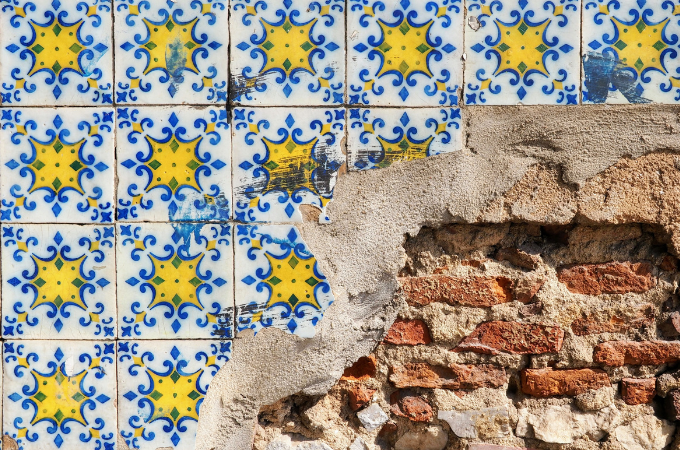
Amal had spent the last three months in Toronto swinging between cleaning hallways at the Eaton Center and perfecting her English at the local community college. While on the job she did her best to execute an earnest “excuse me,” as she crept behind customers never quite mustering the courage to look them in the eye. Once they swung past her, her eyes often trailed behind them as cosmeticians massaged their hands with the latest hand cream or when they sniffed strips of paper laced with perfume.
Sumaya was due to arrive in 30 minutes. It was just enough time to hide any trace of this job she had to tolerate. As hand sanitizer trickled onto her palms, Amal squinted her eyes and inspected her appearance. Long gone were the days of whitening creams, coffee scrubs and eyes laced with kohl. She now sported hollows under her eyes, protruding cheekbones, dry patches of skin on her cupids bow and between her eyebrows. Worn and rusty after three months. Feeling her gut constrict, she made her way to the food court with her head bent counting the square tiles, anticipation tinged with dread pumping through her. Through the corner of her eye, Amal saw Sumaya. She seemed oblivious to those around her as she paraded across the food court. She got closer, and Amal pretended that she was reading a book.
“Oh my god, I thought I would never find you. Gosh, you look the picture of loneliness. What are you doing in this corner?!”
“Salam Sumaya.”
“How is Canada treating you?”
“It’s good, good.”
“Gosh, I’m so sorry we haven’t met earlier.”
“It’s ok, no worries.”
“You should really come over one of these days. You’d love the new house.”
Sumaya had been saying the same thing the few times they spoke since she arrived. Earnest pleas for her to come that never materialize. All she had heard was the saccharine automatic message of her voice mail. Amal noticed the fat diamond ring on Sumaya’s finger, the engraved angles gleaming as she swung her hands. The baby had 3 gold bracelets with her name engraved and a pacifier with a Canadian flag on it. Sumaya talked without pause. The parties she hosted, how wonderful Geoff was and all the pain she had spared herself by marrying a western man. Where was this Canada she spoke of with such relish? The Canada she knew was one of nails peeling from washing the dishes, sniggers whenever she slipped in her pronunciation at the community college and efforts to stifle tears as cars honked in the middle of the night.
As a young girl when Amal heard stories of life in Canada, England, or the USA; it felt as though they were the lands of summits. Places where people asserted their convictions unencumbered and needed no alibi or pretence to stand by their opinions. An existence beyond the stuffiness of Khartoum. She had seen these westerners before, headhunting them in cafés she could not afford, and tracing their every move. There was a captivating self-assurance about the way they carried themselves, and their apparent disregard for everything that ensnared her. They walked upright as if held by pegs. When they spoke, their gaze wasn’t dispersed in anticipation of the reactions and mannerisms of those around them. The women stroked their hair in full view, their broad smiles showing off gums and gaps between their teeth. They laughed so loud they startled the people around them. They were oblivious to all the stares from locals that tapped one another, sometimes pointing at them as they sucked tamarind juice with their straws, chins bent and eyes wide open like kittens.
Back then, Amal was convinced that that western world must resemble these people. It must gallop and leap the way her heart did when she saw them. The world she knew Sumaya had access to. Sumaya came to Khartoum from Toronto each August for 3 weeks – never more and never less. She had been coming to Khartoum since she was an infant, an age she had spent in a state of perpetual sulking. “You’ll end up as wrinkled as stale bread by the time you’re seventeen if you continue like this,” her mother would say. Amal remembered the atmosphere right before they arrived. The frantic energy that possessed her mother as she paced between the rooms and the kitchen inspecting them for adequate amounts of flour, sugar, and powdered milk. New sheets that were usually reserved for Eid were laid out, and everything was scrubbed, polished, or replaced if possible. Amal’s mother feared shame and condescension from the “khawajas,” or westerners, but for Amal her stance was not as clean-cut. Hers was the insatiable draw to Sumaya. Her mannerisms, command of English and possessions. Sumaya’s presence engulfed her but was always followed by aching deflation.
When Sumaya cried and said she didn’t want to pee into a hole stuffed with flies, or when she said that sorghum pancakes tasted like sour bricks and the okra sauce which they all loved looked like slime, Amal lowered her gaze and felt her insides curl. While Amal withdrew, the other children found ways to prick her. They knew she struggled to pronounce letters such as “kha” and “a’aa”, and often egged her on to their own amusement. “I bet you can’t say Sana’a and Khartoum. Come on, it’s important to know the capitals from around here. The world doesn’t revolve around Toronto you know.” Sumaya fell for it all the time. She did her best to constrict her abdomen and emulate them. The resulting sound was mangled and coarse, like she was scratching her throat. The neighborhood kids squealed with laughter and began imitating her. “What are you doing? Don’t you know she’s a guest!” Amal’s mother said, fuming. She grabbed a branch from the nearby neem tree and bolted towards them.
Another time, after tea they told her there was a one-eyed djinn that appeared in the bathroom after sunset. Her nerves were set aflame and to her horror she woke up to the sounds of children screaming, “Pee pee head, you wet the bed!” Amal remembered always remaining on the sidelines, kneeling on the floor, her elbow resting on her mother’s lap, eyes alert and mouth agape staring at Sumaya. Whether it was the sparkly slippers which shone in the midday heat or her accessories, something constricted her chest and arrested her mid-breath when she beheld Sumaya. She darted between Sumaya’s slippers and her own, touched the ribbons on her pigtails, starched from washing and a dirty-off white color while inspecting Sumaya’s fancy hair-ties, or “buklas” as they were called, with their varnished sheen and Minnie Mouse cubes at the ends. It was always a tangle, a push-pull conundrum that thrusted her forward despite feeling burned every time.
One day Amal and Sumaya went out alone. Earlier in the afternoon, ten female cousins were sitting in the diwan chatting on rickety beds that dug into the sand and squeaked with each shove. Electricity being cut, they sneaked in a small radio. To the tune of its muffled sounds they threaded their eyebrows, placed toothpaste on their pimples, and reached for skin whitening creams in preparation for the wedding. The scent of watermelon chewing gum fanned the air. Sumaya opened her wardrobe and piles of clothes tumbled down.
“Oh shit, I forgot something!” While Sumaya was out of sight, Amal processed each item: undershirts, several ruby colored brooches, a padded bra, and white underwear with blue polka dots. When Sumaya came back Amal had picked up her clothes and began handing them over one by one. While handing over the underwear, Amal noticed blotches of blood on it and gasped. “What, you don’t have your period yet? It’s just blood,” said Sumaya. Amal opened the adjacent wardrobe and pretended to be searching for clothes. She had one black and one navy-blue skirt for going out, and the only clean shirt was a mustard-colored blouse with missing buttons. “Ok, I’m ready can you pick something from your wardrobe and get ready now?” Amal felt a throbbing heat rise to the tips of her ears and temples. That was not what she had hoped to hear.
“Oh yes, sure. Let me head to the bathroom.”
“You can change here you know it’s just me.”
“I-it’s fine, I’ll be right back.” Amal rushed to the bathroom. As she buttoned her shirt, she could already feel the glare of people they would meet outside comparing and contrasting the two, puzzled at the unlikely match. Cinderella and her ragged stepsister. She cupped her hands over her face and felt as though a boulder lay in her gut.
Amal fidgeted the whole way there. When they arrived, Nile Street was peppered with couples encircling tea ladies. The setting sun tinged the amber sky, and it was cool enough to sit outside without sweat dripping down their thighs. The tea ladies called one another from afar, asking to borrow ginger and cinnamon. Amal and Sumaya sat down and ordered cardamon tea with luqaimat, they had craved the sugar-dunked donuts for some time.
“What’s it like in Canada?” Sumaya spoke of large, low-lying buildings that housed clusters of shops. They were called malls and had restaurants and cinemas inside. Amal sat with her palm resting on her chin and felt as though her heart lay in her throat. She began snapping her fingers and shaking her legs. “Sumaya, do you think I could go one day?”
“Umm, sure… I guess. You never know right?”
In that moment, it all became apparent. The distance between them, crusts of sand and dust on her shoes, buttons missing in her shirt and the shoddy atmosphere before her complete with barefoot children playing soccer with plastic bottles and mothers cradling babies begging for spare change. She could go to Canada, to Mars if she wanted to, but to be a part of her world was another thing altogether.
Photo by Natalia Y. on Unsplash



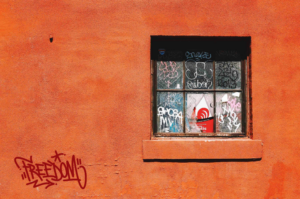

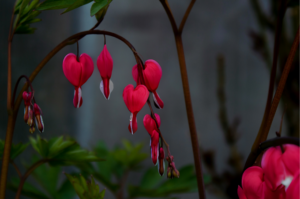
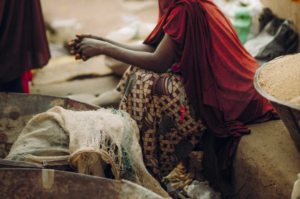

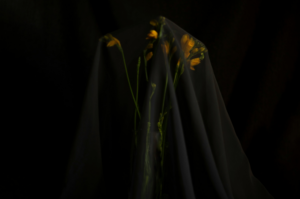

Uche Balogun April 04, 2023 04:10
I enjoyed reading this. Well done, Saddab.